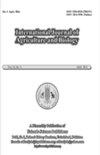{"title":"化学改良对不同盐碱条件下水稻生理化学反应的影响","authors":"A. Qadir","doi":"10.17957/ijab/15.1813","DOIUrl":null,"url":null,"abstract":"Salinity and sodicity are the major abiotic constraints that prevail in arid and semi-arid regions. Proper management is required for productive use of this land. Reclamation of sodic and saline-sodic soils is highly site-specific that describes the diverse response of different soils to different amendments. These reclamation practices also alter the plant's physiological and ionic characteristics. This experiment aimed to better understand the physiological and ionic responses of rice crop at different salinity/sodicity levels. A lysimeter experiment was set forth with soil having ECe (dS m-1):SAR (mmol L-1)1/2 levels as 4:20, 8:40, 12:60 and 16:80 and all the levels were treated with organic (farm manure at 25 Mg ha-1) and inorganic (gypsum at 100% soil gypsum requirement (SGR) and sulphuric acid equivalent to 100% SGR) amendments keeping no ammendment as control. Results revealed that the maximum relative increase in physiological attributes (photosynthetic rate, transpiration rate, stomatal conductance and total chlorophyll contents), ionic contents (nitrogen, potassium and K:Na ratio) and growth of rice were recorded with sulphuric acid application followed by gypsum. On an average 25%, 31% and 45% increase in biological yield, plant height and paddy yield, respectively was observed with sulphuric acid application over control. It is concluded that sulphuric acid and gypsum both were the best amendments for reclamation of soil having a low level of salinity/sodicity whereas, at higher salinity/sodicity levels, only sulphuric acid seemed better for improved rice production. © 2021 Friends Science Publishers","PeriodicalId":13769,"journal":{"name":"International Journal of Agriculture and Biology","volume":null,"pages":null},"PeriodicalIF":0.0000,"publicationDate":"2021-07-01","publicationTypes":"Journal Article","fieldsOfStudy":null,"isOpenAccess":false,"openAccessPdf":"","citationCount":"4","resultStr":"{\"title\":\"Effect of Chemical Reclamation on the Physiological and Chemical Response of Rice Grown in Varying Salinity and Sodicity Conditions\",\"authors\":\"A. Qadir\",\"doi\":\"10.17957/ijab/15.1813\",\"DOIUrl\":null,\"url\":null,\"abstract\":\"Salinity and sodicity are the major abiotic constraints that prevail in arid and semi-arid regions. Proper management is required for productive use of this land. Reclamation of sodic and saline-sodic soils is highly site-specific that describes the diverse response of different soils to different amendments. These reclamation practices also alter the plant's physiological and ionic characteristics. This experiment aimed to better understand the physiological and ionic responses of rice crop at different salinity/sodicity levels. A lysimeter experiment was set forth with soil having ECe (dS m-1):SAR (mmol L-1)1/2 levels as 4:20, 8:40, 12:60 and 16:80 and all the levels were treated with organic (farm manure at 25 Mg ha-1) and inorganic (gypsum at 100% soil gypsum requirement (SGR) and sulphuric acid equivalent to 100% SGR) amendments keeping no ammendment as control. Results revealed that the maximum relative increase in physiological attributes (photosynthetic rate, transpiration rate, stomatal conductance and total chlorophyll contents), ionic contents (nitrogen, potassium and K:Na ratio) and growth of rice were recorded with sulphuric acid application followed by gypsum. On an average 25%, 31% and 45% increase in biological yield, plant height and paddy yield, respectively was observed with sulphuric acid application over control. It is concluded that sulphuric acid and gypsum both were the best amendments for reclamation of soil having a low level of salinity/sodicity whereas, at higher salinity/sodicity levels, only sulphuric acid seemed better for improved rice production. © 2021 Friends Science Publishers\",\"PeriodicalId\":13769,\"journal\":{\"name\":\"International Journal of Agriculture and Biology\",\"volume\":null,\"pages\":null},\"PeriodicalIF\":0.0000,\"publicationDate\":\"2021-07-01\",\"publicationTypes\":\"Journal Article\",\"fieldsOfStudy\":null,\"isOpenAccess\":false,\"openAccessPdf\":\"\",\"citationCount\":\"4\",\"resultStr\":null,\"platform\":\"Semanticscholar\",\"paperid\":null,\"PeriodicalName\":\"International Journal of Agriculture and Biology\",\"FirstCategoryId\":\"1085\",\"ListUrlMain\":\"https://doi.org/10.17957/ijab/15.1813\",\"RegionNum\":0,\"RegionCategory\":null,\"ArticlePicture\":[],\"TitleCN\":null,\"AbstractTextCN\":null,\"PMCID\":null,\"EPubDate\":\"\",\"PubModel\":\"\",\"JCR\":\"Q2\",\"JCRName\":\"Agricultural and Biological Sciences\",\"Score\":null,\"Total\":0}","platform":"Semanticscholar","paperid":null,"PeriodicalName":"International Journal of Agriculture and Biology","FirstCategoryId":"1085","ListUrlMain":"https://doi.org/10.17957/ijab/15.1813","RegionNum":0,"RegionCategory":null,"ArticlePicture":[],"TitleCN":null,"AbstractTextCN":null,"PMCID":null,"EPubDate":"","PubModel":"","JCR":"Q2","JCRName":"Agricultural and Biological Sciences","Score":null,"Total":0}
引用次数: 4
Effect of Chemical Reclamation on the Physiological and Chemical Response of Rice Grown in Varying Salinity and Sodicity Conditions
Salinity and sodicity are the major abiotic constraints that prevail in arid and semi-arid regions. Proper management is required for productive use of this land. Reclamation of sodic and saline-sodic soils is highly site-specific that describes the diverse response of different soils to different amendments. These reclamation practices also alter the plant's physiological and ionic characteristics. This experiment aimed to better understand the physiological and ionic responses of rice crop at different salinity/sodicity levels. A lysimeter experiment was set forth with soil having ECe (dS m-1):SAR (mmol L-1)1/2 levels as 4:20, 8:40, 12:60 and 16:80 and all the levels were treated with organic (farm manure at 25 Mg ha-1) and inorganic (gypsum at 100% soil gypsum requirement (SGR) and sulphuric acid equivalent to 100% SGR) amendments keeping no ammendment as control. Results revealed that the maximum relative increase in physiological attributes (photosynthetic rate, transpiration rate, stomatal conductance and total chlorophyll contents), ionic contents (nitrogen, potassium and K:Na ratio) and growth of rice were recorded with sulphuric acid application followed by gypsum. On an average 25%, 31% and 45% increase in biological yield, plant height and paddy yield, respectively was observed with sulphuric acid application over control. It is concluded that sulphuric acid and gypsum both were the best amendments for reclamation of soil having a low level of salinity/sodicity whereas, at higher salinity/sodicity levels, only sulphuric acid seemed better for improved rice production. © 2021 Friends Science Publishers


